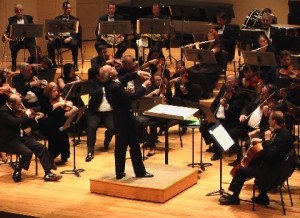
MISO rehearsal becomes music for a cause
Few causes have gained so much attention in recent years as the battle over breast cancer, to the point that the color pink is now routinely associated with the efforts of Susan G. Komen for the Cure.
On Sunday, that agency and the Miami Symphony Orchestra will team for a special afternoon at the symphony in which breast cancer survivors and underprivileged Miamians will attend the dress rehearsal of the orchestra’s An Evening in Vienna program, which will be performed that same night in the Knight Concert Hall.
Publicists for the MISO say that the 200 guests will also get to meet with conductor Eduardo Marturet and the members of the orchestra after the music. The noon program will feature the music of the Viennese New Year’s concerts that have become traditional around the world, especially including pieces by Johann Strauss II. Also on the bill of fare are the Bruch Violin Concerto No. 1 (with soloist Dani Andai) and The Moldau, Bedrich Smetana’s much-beloved ode to the river that winds through Prague.
In addition, regular concertgoers can contribute to the cause as well. There’s a special 25 percent Komen discount on tickets for the Sunday night concert, and 10 percent of the proceeds will go to the Komen organization.
This is obviously a laudable effort, and it also addresses the importance of outreach for cultural organizations. Arts organizations have a long history of giving back, as the current popular term has it, and sharing music with people is a fine way of spreading goodwill about your group.
It reminds me that one of the most popular pieces in the repertoire, George Frideric Handel’s oratorio Messiah, was written originally for a benefit concert in Dublin in 1742, “for the Relief of the Prisoners in the several [Jails], and for the Support of Mercer’s Hospital in Stephen’s Street, and of the Charitable Infirmary on the Inns Quay,” as an original newspaper advertisement had it. It’s somehow fitting that the sounds of He Shall Feed His Flock were first designed to raise money for some of the most destitute people of Handel’s time.
Charitable work has taken on an even higher profile in the entertainment industry at large, as well. Rare is the television or movie personality today who does not routinely make the rounds of charitable events, using the privilege of their positions to raise awareness for pressing societal needs.
Sunday’s free concert (called Music for the Soul) is part of a vigorous tradition in which the needs of audience-building for an arts group, fund raising for a charity, and cultural education for families can come together in one setting. It seems to me to be a smart way to take a task that had to be done anyway – a dress rehearsal – and turn it into a moment in which the larger communicative goals of artistic activity can be realized all at one go.
And I don’t doubt that everyone will have a good time.